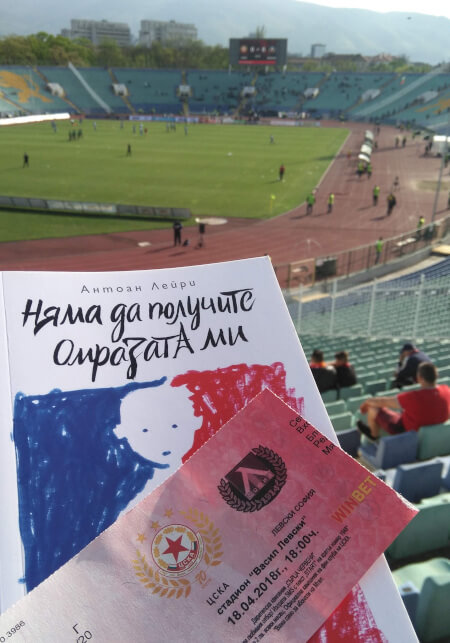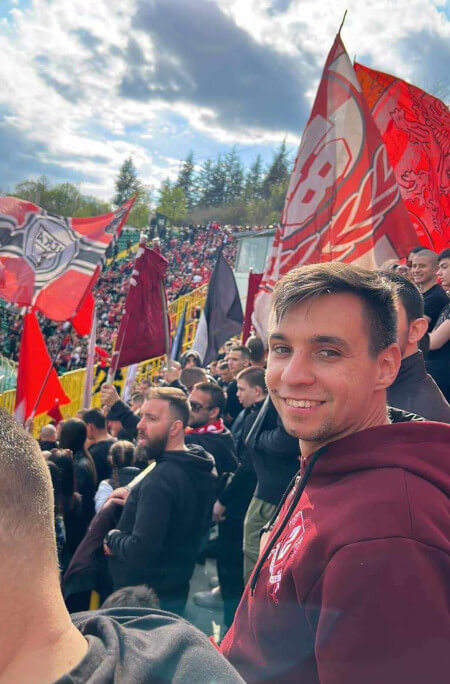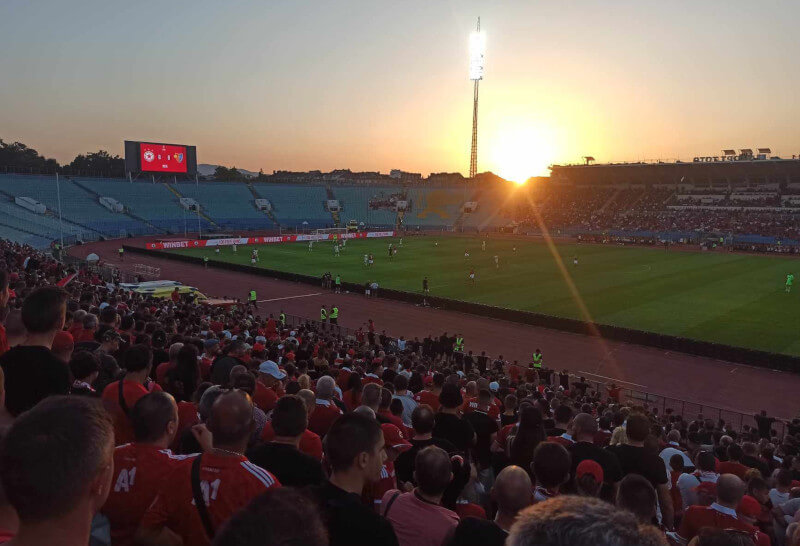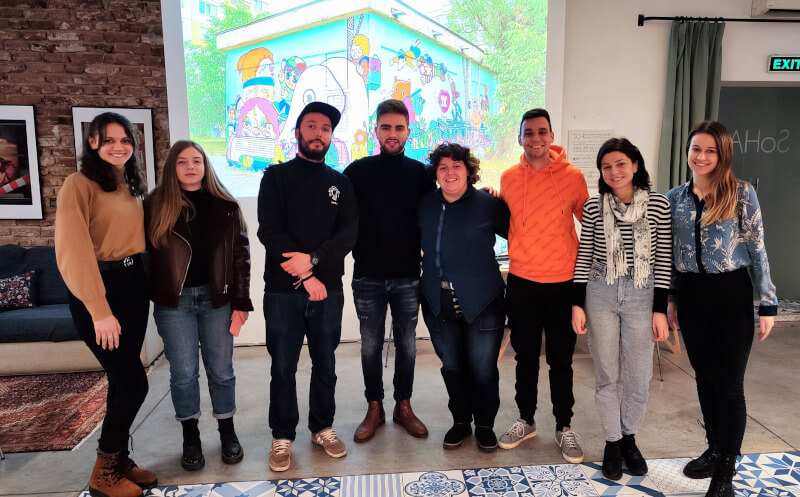
By Radoslav Aleksandrov
Radoslav Aleksandrov is a graduate of the 2023 class of the America for Bulgaria Foundation’s Media E:volution program.
The light spring rain had subsided, the gray clouds were disappearing from the sky, and the sun was beginning to set. However, the air was electrified. Fifteen thousand people shivered in anticipation. Their hope was slowly fading with each passing second. Their favorite team was just two games away from becoming champions for the first time in 15 years. The first of these two decisive contests was nearly over; even extra time was coming to an end. It was the 96th minute, with less than 120 seconds left until the final whistle.
We were locked in an embrace again. With lumps in our throats, disappointment in our eyes, but together, side by side, as we had been for the past ten months. We knew that everything we had longed for was slipping away like a handful of sand between our fingers.
Desperate last-ditch attempts at attack, a long cross into the penalty area, a header deflecting the ball and… Oh my! It’s a penalty. This must be a penalty. The Red Stadium erupted. We started jumping, our eyes shining. We were pulling on our T-shirts. We wondered if we had seen the same thing. It should be a penalty kick in our favor in the last minute of this game. We were shaking, holding our heads, rubbing our watery eyes, jumping up and down. We formed a circle, embracing tightly.
For a moment I saw our history flash before my eyes. How did we get to this moment? How did six such different people become one? We were a community.
Community to me has always been a group of individuals with many common interests and values. But these guys, some of whom I didn’t know several months ago, made me think again. What is a community? Why does a community work the way it does? What makes a connection so strong and valuable that it continues to hold people together?
A community is a group of people who can overcome all differences if they are united by something greater, an idea for which they are ready to put aside everything else—political views, career and age differences, interests. Community teaches patience, trust, and faith. It doesn’t build walls—it unites.

There are great communities in Bulgaria who are working to make their country a better place. For themselves, for the people around them, for posterity. Despite our frightening reality and radically polarized society.
But I want to tell you about the small community that came together accidentally but naturally and became an integral part of my life. Because I find laughter in my community; it teaches me to enjoy the little things and look forward to the future. It reminds me of what it means to be human in the turbulence of everyday life. How can we contribute to society if we lack the strength to keep going? That’s why we need support.
My little soccer community is not a catalyst for change, but it makes the lives of six people a little better, and each one of us tries to live with dignity and be helpful to the others. This group is an example that, next to a strong, unifying idea, everything else is insignificant.
I remember our first meeting on a cold December evening in 2021. I had no idea that the people I shared those 90 minutes with would become an indelible part of my life today. In the spring, we continued to meet at soccer games. We would talk before, during, and after each game. We would start with soccer and move on to education, work, personal history, views, dreams, values. Game after game, we kept looking forward to our next meeting.
On July 10, 2022, we started the season together. Our group expanded. We are so different from one another, we come from different parts of Bulgaria, but we are united by our support for our favorite team.
Soccer fans are spoken about in extremely pejorative terms in Bulgaria. This goes especially for extreme soccer fans and those who share a stand with them. Fans who jump and sing throughout the game, do choreographies, light torches, and wave flags and scarves.
People always look at me in bewilderment when I tell them that I’m at the stadium every weekend. “But how? You are educated, you are interested in literature, history, you know so many interesting people, what do you find there?” I’m tired of looking for an answer to this question.
At the stadium, I find myself. I find an adequate outlet for everything. I learn loyalty, discipline, friendship, and love. I found people I can count on.
For the last 10 months, we have been together in both joy and sadness. Those five guys and I. We were behind the team despite the organized fans’ boycott over mismanagement and poor play and despite the humiliating defeat by our arch-enemy. We were there, come sun, rain, or snow. We were there in the hilly village of Bistrica, in Stara Zagora, Pazardzhik, Blagoevgrad, Razgrad, and even in Saedinenie. Together. Side by side. And as the months went by, we met many more people like us who put their differences aside for the sake of a common cause.

This group is extremely diverse. Young people with different backgrounds, interests, political views, and values—and yet together. Respectful to and supportive of each other. Because they are a community.
I have been part of a number of different communities in my life so far—professional, educational, literary, friendship-based. But no other group has taught me the lessons I learned from this one. That’s why I’m talking about this community. It shows that we humans are capable of finding the idea that unites us—the higher meaning that helps us put our differences behind us.
The world is frighteningly fragmented. Public antagonism on all sorts of important subjects is growing, and consensus has never seemed so distant to me. It’s as if compromise is impossible. But true community brings connection, not division.
Every group can find at least one thing in common with a despised opposing group. Because we are human and nothing human is alien to us. Despite everything that separates us, there is always something greater to unite us. We just have to find it. Like we did.


